Nsg 5003 chapter 2 - Study guides, Class notes & Summaries
Looking for the best study guides, study notes and summaries about Nsg 5003 chapter 2? On this page you'll find 48 study documents about Nsg 5003 chapter 2.
Page 4 out of 48 results
Sort by
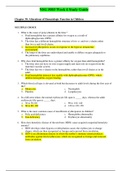
-
NSG 5003 Week 4 Study Guide - Chapter 30 -32
- Exam (elaborations) • 16 pages • 2021
- Available in package deal
-
- $20.49
- + learn more
NSG 5003 Week 4 Study Guide Chapter 30: Alterations of Hematologic Function in Children MULTIPLE CHOICE 1. What is the cause of polycythemia in the fetus? 2. Why does fetal hemoglobin have a greater affinity for oxygen than adult hemoglobin? 3. Which blood cell type is elevated at birth but decreases to adult levels during the first year of life? 4. In a full-term infant, the normal erythrocyte life span is _____ days, whereas the adult erythrocyte life span is _____ ...
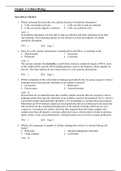
-
Exam (elaborations) NSG 5003/NSG 5003 (NSG 5003/NSG 5003) PATHOPHYSIOLOGY 8TH EDITION MCCANCE TEST BANK / TEXT BANK McCance, Huether Pathophysiology The Biological, Complete all chapters, /
- Exam (elaborations) • 289 pages • 2021
-
- $18.99
- + learn more
Exam (elaborations) NSG 5003/NSG 5003 (NSG 5003/NSG 5003) PATHOPHYSIOLOGY 8TH EDITION MCCANCE TEST BANK / TEXT BANK McCance, Huether Pathophysiology The Biological, Complete all chapters, / PATHOPHYSIOLOGY 8TH EDITION MCCANCE TEST BANK Chapter 1: Cellular Biology MULTIPLE CHOICE 1. Which statement best describes the cellular function of metabolic absorption? a. Cells can produce proteins. c. Cells can take in and use nutrients. b. Cells can secrete digestive enzymes. d. Cells can synthesize fa...
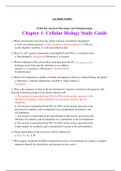
-
NURS 501 Advanced Physiology and Pathophysiology Chapter 1: Cellular Biology Study Guide/Exam (elaborations) NSG 5003/NSG 5003
- Exam (elaborations) • 113 pages • 2021
-
- $20.49
- + learn more
NURS 501 Advanced Physiology and Pathophysiology Chapter 1: Cellular Biology Study Guide/Exam (elaborations) NSG 5003/NSG 5003 501 Study Guides NURS 501 Advanced Physiology and Pathophysiology Chapter 1: Cellular Biology Study Guide 1. Which statement best describes the cellular function of metabolic absorption? a. Cells can produce proteins. c. Cells can take in and use nutrients. b. Cells can secrete digestive enzymes. d. Cells can synthesize fats. 2. Most of a cell’s g...
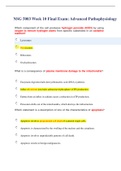
-
NSG 5003 Week 10 Final Exam: Advanced Pathophysiology
- Exam (elaborations) • 18 pages • 2021
- Available in package deal
-
- $15.99
- + learn more
NSG 5003 Week 10 Final Exam: Advanced Pathophysiology Which component of the cell produces hydrogen peroxide (H2O2) by using oxygen to remove hydrogen atoms from specific substrates in an oxidative reaction? What is a consequence of plasma membrane damage to the mitochondria? Which statement is a description of one of the characteristics of apoptosis? During cell injury caused by hypoxia, sodium and water move into the cell because: What is an effect of ionizing radiation exposure? options: chap...
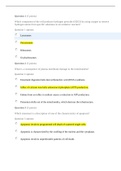
-
NSG 5003-Final Exam Questions and Answers
- Exam (elaborations) • 19 pages • 2021
-
- $10.99
- + learn more
NSG 5003-Final Exam Questions and Answers Question 1 (5 points) Which component of the cell produces hydrogen peroxide (H2O2) by using oxygen to remove hydrogen atoms from specific substrates in an oxidative reaction? Question 1 options: Lysosomes Peroxisomes Ribosomes Oxyhydrosomes Question 2 (5 points) What is a consequence of plasma membrane damage to the mitochondria? Question 2 options: Enzymatic digestion halts deoxyribonucleic acid (DNA) synthesis. Influx of calcium ions ha...
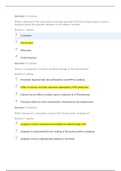
-
NSG 5003 FINAL EXAM.LATEST UPDATE
- Exam (elaborations) • 19 pages • 2020
- Available in package deal
-
- $19.49
- 3x sold
- + learn more
NSG 5003 Final Exam Week 10: Advanced Pathophysiology: Which component of the cell produces hydrogen peroxide (H2O2) by using oxygen to remove hydrogen atoms from specific substrates in an oxidative reaction? What is a consequence of plasma membrane damage to the mitochondria? Which statement is a description of one of the characteristics of apoptosis? During cell injury caused by hypoxia, sodium and water move into the cell because: What is an effect of ionizing radiation exposure? options: ch...
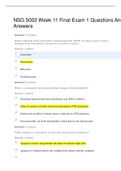
-
NSG 5003 Week 11 Final Exam 1 Questions And Answers
- Exam (elaborations) • 20 pages • 2021
-
- $18.49
- + learn more
NSG 5003 Final: Advanced pathophysiology: South University Question 1 (5 points) Which component of the cell produces hydrogen peroxide (H2O2) by using oxygen to remove hydrogen atoms from spe cific substrates in an oxidative reaction? Question 2 (5 points) What is a consequence of plasma membrane damage to the mitochondria? Question 3 (5 points) Which statement is a description of one of the characteristics of apoptosis? Question 4 (5 points) During cell injury caused by hypoxia, sodium and wat...
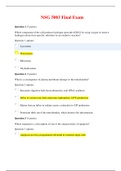
-
SOUTH UNIVERSITY NSG5003 ADVANCED PATHOPHYSIOLOGY FINAL EXAM 2020 (VERSION-1)|100% CORRECT ANSWERS, DOWNLOAD TO SCORE A|
- Exam (elaborations) • 19 pages • 2020
-
Available in package deal
-
- $18.49
- + learn more
NSG5003 Final Exam / NSG 5003 Final Exam: Advanced pathophysiology: South University South University NSG5003 Final Exam / South University NSG 5003 Final Exam Question 1 (5 points) Which component of the cell produces hydrogen peroxide (H2O2) by using oxygen to remove hydrogen atoms from specific substrates in an oxidative reaction? Question 1 options: Lysosomes Peroxisomes Ribosomes Oxyhydrosomes Question 2 (5 points) What is a consequence of plasma membrane damage to the mitocho...
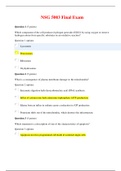
-
NSG 5003 FINAL EXAM / NSG5003 FINAL EXAM (VERSION-1, LATEST- 2020): ADVANCED PATHOPHYSIOLOGY: SOUTH UNIVERSITY |100% CORRECT ANSWERS, DOWNLOAD TO SCORE A|
- Exam (elaborations) • 19 pages • 2020
-
Available in package deal
-
- $18.49
- + learn more
NSG5003 Final Exam / NSG 5003 Final Exam: Advanced pathophysiology: South University South University NSG5003 Final Exam / South University NSG 5003 Final Exam Question 1 (5 points) Which component of the cell produces hydrogen peroxide (H2O2) by using oxygen to remove hydrogen atoms from specific substrates in an oxidative reaction? Question 1 options: Lysosomes Peroxisomes Ribosomes Oxyhydrosomes Question 2 (5 points) What is a consequence of plasma membrane damage to the mitocho...
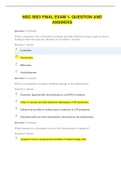
-
NSG 5003 FINAL EXAM 1- QUESTION AND ANSWERS
- Exam (elaborations) • 19 pages • 2021
-
- $12.00
- + learn more
NSG 5003 FINAL EXAM 1- QUESTION AND ANSWERS Question 1 (5 points) Which component of the cell produces hydrogen peroxide (H2O2) by using oxygen to remove hydrogen atoms from specific substrates in an oxidative reaction? Question 1 options: Lysosomes Peroxisomes Ribosomes Oxyhydrosomes Question 2 (5 points) What is a consequence of plasma membrane damage to the mitochondria? Question 2 options: Enzymatic digestion halts deoxyribonucleic acid (DNA) synthesis. ...

Did you know that on average a seller on Stuvia earns $82 per month selling study resources? Hmm, hint, hint. Discover all about earning on Stuvia


